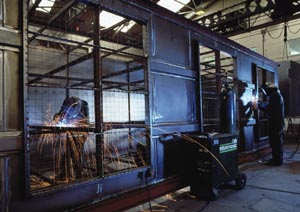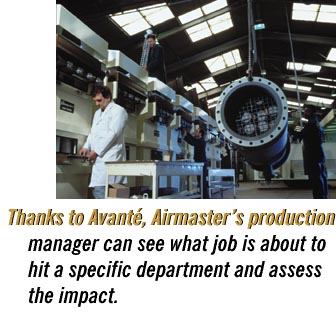
VOLUME 1, NUMBER 2 | SUMMER 1998

Case Study:
Airmaster
Information technology system creates additional business opportunities for air filter manufacturer
The ability to react rapidly to new business opportunities is one of the most critical factors in achieving competitive success in today's marketplace. But for many organizations, that inherent flexibility essential to move into a burgeoning new sector is often constrained by the IT solution in place. This was the situation faced by environmental air filter manufacturer Airmaster in 1994 � which led to the company replacing its existing Tetra Chameleon system with Avant� from DataWorks Europe Limited.
Established in 1960, Airmaster is now part of the Danish DISA Technologies Group. Airmaster is a specialist in providing clean air solutions. The company designs, manufactures and services a range of environmental products for the control of airborne dust particles and the separation of particulate products from conveying air streams. The products range from simple standard package filters to purpose designed filter systems and are sold via direct sales force, through resellers and OEMS and through the company's turnkey division which develops total solutions for the foundry sector. Market opportunities for Airmaster continue to burgeon as emissions legislation becomes tighter worldwide.
"Legislation plays a part in what we do," explains Andrew Barratt, IT manager at Airmaster. "As the focus on reducing health hazards through limiting emissions continues, we can find ourselves with a totally new market to exploit." This happened in 1993 when the legislation targeted the foundry industry. "No one had a dry extraction solution in this area � it was all wet collection," Barratt continues. "The legislators insisted on a reduction of emissions which drove us to develop a dry solution, and we have generated over �6 million in revenue in this area in two years."
However, while clear business opportunities were arising, Airmaster found itself in a Catch 22 situation: the existing technology infrastructure could not support additional growth without employing large numbers of additional personnel. As Barratt explains, "The Tetra Chameleon system we were using was essentially a make-to-stock system. But the nature of the business has changed: customers are more demanding, the pressure on delivery performance is intense and customers want tightly focused solutions." In addition to being a make-to-stock solution, the system was geared toward production and accounts rather than sales. "It was also inflexible and user unfriendly," Barratt says. "We wanted to grow the business and Chameleon was very constraining."
As a result the company decided to appraise other solutions in the marketplace with clearly defined criteria. "The new system had to be totally business oriented, flexible, user-friendly and capable of taking Airmaster forward into foreseeable IT developments," Barratt says. "But, critically, it had to be a make-to-order system."
After significant product evaluations, Airmaster opted to implement Avant� from DataWorks. Barratt explains: "The more we dealt with DataWorks the more impressed we were with their professionalism. As for the Avant� software, one of the key differentiators for our business was the tremendous potential for order cycle reduction and management control introduced by the Product Configurator.
"We have such a broad product range that the ability to assemble a product to meet a customer's specific needs in a component form, quickly and easily without having to write a bill of materials, is very compelling," he adds. The system was implemented in 1996 running on a Sun MicroSystems SparcStation. The company gained immediate benefits from the technology, according to Barratt, particularly in gaining a new financial handle on the profitability of specific contracts. "Prior to this implementation we could never attain an accurate figure on our margins during the sales cycle. The rules we have set up within configurator have proved to be within 2 percent of the actual budget on most jobs which is a good level of accuracy."
Key to this has been the development of labor routines since it is labor costs that define the overall project cost. "We use configurator for everything," Barratt says. "It creates the bill of materials, selects the production routings, calculates routing times, and assesses the level of hazard associated with a specific job which is critical since dust is very explosive." Airmaster also uses the scripting element within the product to automatically generate quotations. This visibility of information has already impacted the company's sales profile. "It has helped us to standardize," he says. "We have a very broad range of components and, with configurator, you can only select valid options. We have also made certain options either predefined or preferred which prevents sales people from going out on a limb."
In addition, since the configurator automatically creates the bill of materials, information is presented at the factory floor in a consistent fashion. As a result of this standardization and the use of optimization techniques, Airmaster has been able to rationalize its stock holding extensively and now only holds fast turnaround components. "Avant� gives us the control to make just what we need when we need it," Barratt says, "which has driven down stock levels."
The ability to closely assess margin levels on products has led, in some cases, to Airmaster replacing in-house manufacturing with external sourcing of products where it is more cost effective. One of the key requirements for the new system was to automate the process of data capture. Airmaster's production cycle involves widely varying time cycles for specific job completion � from minutes within areas such as metal pressing, to several hours for assembly or painting. On the old system, information on job status was, at best, two to three days out of date.
The Avant� solution has been combined with a barcode-based Data Capture solution from INTERMEC, which ensures every job is immediately registered on the system as it is completed. "Previously we had two people dedicated to manually inputting this information," Barratt says. "Now all labor information is handled automatically and Avant� raises any inconsistencies."
Airmaster carries out data capture uploads three to four times a day, "So we know exactly where we are," Barratt continues. In addition to ensuring that any potential delays are immediately picked up and addressed, this also enables the company to answer any customer questions about product delivery immediately. This has revolutionized Airmaster's capacity planning activities which were previously, according to Barratt, "very, very rough."
 "With Avant� we have the ability to take a snapshot � be it daily, weekly or monthly, and drill down through the information to assess the load experienced by each department," Barratt says. In addition, the production manager can then look forward to see what job load is about to hit a specific department and assess the impact that will have.
"With Avant� we have the ability to take a snapshot � be it daily, weekly or monthly, and drill down through the information to assess the load experienced by each department," Barratt says. In addition, the production manager can then look forward to see what job load is about to hit a specific department and assess the impact that will have.
"We have total visibility," Barratt adds. Airmaster also intends to open up that information view to the sales force to enable them to provide customers with realistic delivery dates � a move that will have a two-fold benefit. "The sales teams tend to sell towards the end of the month which creates an end-of-month peak in delivery," he continues. "Now they can look at our production capacity information and assess a more suitable delivery date � which will often be sooner. So, not only will the customer have an earlier, exact delivery date immediately, but we will no longer be subject to unnecessary peaks in demand."
This provision of technology to the sales force has been extended through the use of laptop quotes � a subset of the configurator capability made available to sales personnel on their portable computers. "Laptop quotes enables them to configure the product at the customer's site, running through the available options and bringing the customer into the sale," Barratt explains.
The system demonstrates the breadth of product range and will also highlight potential problems associated with specific option choices. For example, if a customer requests a specific paint option the system can show how much longer the delivery time would be. "The system prompts the sales people through the process," he says. "They cannot propose any filter or combination of filters that cannot be manufactured, and knowing that gives them confidence."
Using a portable printer, they can automatically create a quotation for the customer on the spot. Once an order is received, the sales person can send it back to the head office via a modem link, and it goes automatically into the Avant� system and thus the production cycle. At the same time, any changes in product information are automatically downloaded to the laptop machine.
The investment in the new solution has been significant, and Barratt had to justify that based on savings that could be attained at Airmasters' 1994 turnover rate. "I estimated we could save around �80,000 per annum," he says. The actual savings, he believes, have been significantly larger. In addition, the company has undertaken its expansion, growing at around 20 percent annually over the past two years.
"Without the Avant� implementation we could not have achieved this level of growth," Barratt confirms. And, as legislation changes and new business opportunities arise, he believes Airmaster is well placed to gain clear leadership in new market sectors.
"We have to be able to react to new markets very quickly," he concludes. "With Avant� we now have the flexibility to change and re-design our business processes in line with new opportunities in the marketplace."
Web Site © Copyright 2020 by Lionheart Publishing, Inc.
All rights reserved.
Lionheart Publishing, Inc.
2555 Cumberland Parkway, Suite 299, Atlanta, GA 30339 USA
Phone: +44 23 8110 3411 |
E-mail:
Web: www.lionheartpub.com
Web Design by Premier Web Designs
E-mail: [email protected]